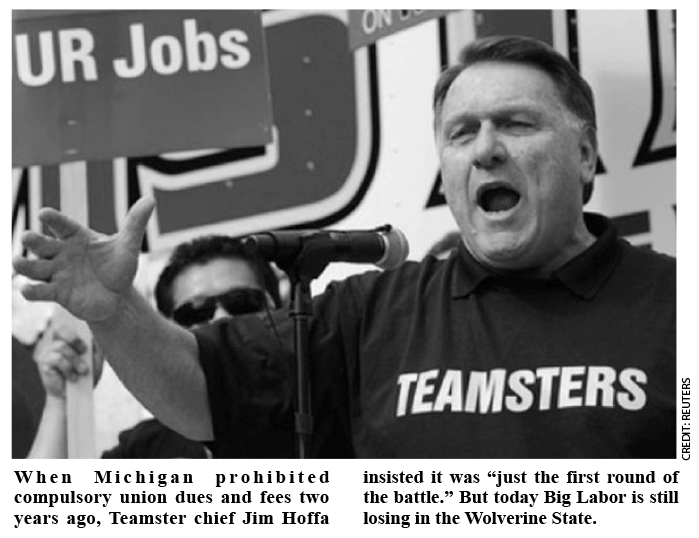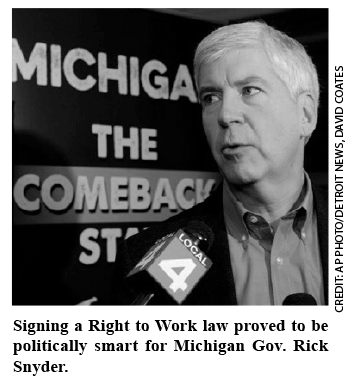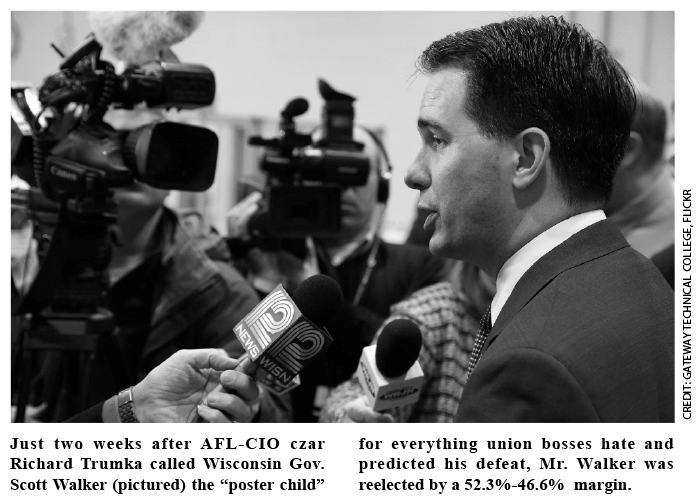Will Team Biden Weaponize Workers’ Pensions?
Big Labor abuse of worker pension and benefit funds as a means of advancing union bosses’ self-aggrandizing policy objectives is a familiar phenomenon.
Voters Reward State Politicians For Barring Forced Union Dues
(Source: November-December 2014 National Right to Work Committee Newsletter)
Just hours after GOP Gov. Rick Snyder outraged and dismayed Big Labor by listening to his freedom-loving constituents and signing private- and public-sector measures making Michigan the 24th Right to Work state on December 11, 2012, Teamster chief Jim Hoffa went on CNN to air his wrath.
The adoption of a ban on forced union dues and fees, Mr. Hoffa vowed, would be “just the first round of a battle that’s going to divide this state. We’re going to have a civil war.”
A few days later, Al Garrett and Larry Roehrig, the two top bosses of Detroit-based Council 25 of the American Federation of State, County, and Municipal Employees (AFSCME/AFL-CIO), declared their intent to destroy the Right to Work law and get “retribution” against supporters in a taped conference call.
In Michigan, Big Labor ‘Was Routed on the Right-to-Work Issue’
“If we were to change the composition of both houses [of the Michigan Legislature],” said Mr. Garrett, “where we were the majority and had the governor, no question we would be able to get rid of it [Right to Work] right away. . . .
“In November of 2014, we vote to change the composition of those bodies.”
 This fall, union bosses from AFL-CIO czar Richard Trumka on down fired up Big Labor’s vast, forced dues-funded political machine to make good on Mr. Garrett’s vow.
This fall, union bosses from AFL-CIO czar Richard Trumka on down fired up Big Labor’s vast, forced dues-funded political machine to make good on Mr. Garrett’s vow.
But on November 4, 2014, the voters of Michigan disregarded union kingpins and gave what can only be regarded as a ringing endorsement to their two-year-old Right to Work law.
Mr. Snyder was reelected over union boss-backed Democratic challenger Mark Schauer. The number of state Senate and state House members who support Right to Work simultaneously expanded.
And voters in Michigan’s 8th Congressional District, which for years has been represented in the U.S. House by Big Labor-appeasing Republican Mike Rogers, elected Mike Bishop (R), a former state Senate majority leader who had campaigned publicly for a state Right to Work law, to succeed Mr. Rogers.
Larry Gabriel, a columnist for Detroit’s Metro Times and obviously no fan of Mr. Snyder or pro-Right to Work Legislators in Lansing, aptly summed up the 2014 Michigan election results in just a few words: Organized Labor, “which has been staunchly in the Dems’ corner, was routed on the right-to-work issue.”
Union-Label Hoosier State Democrats ‘Marginalized’
 In nearby Indiana, which adopted the 23rd state Right to Work law in January 2012, support for compulsory unionism continued to be a political albatross in 2014, just as it had been in 2012 and in election cycles prior to the statute’s enactment.
In nearby Indiana, which adopted the 23rd state Right to Work law in January 2012, support for compulsory unionism continued to be a political albatross in 2014, just as it had been in 2012 and in election cycles prior to the statute’s enactment.
While pro-Right to Work Gov. Mike Pence was not on the ballot this year, the Senate and House leaders who had worked to ban forced union dues and fees saw the pro-Right to Work legislative majorities expand.
With Republicans now set to dominate the Senate, 40-10, and the House, 71-29, union-label Democratic politicians are “marginalized,” as the Indianapolis Star’s headline for a post-election AP story put it.
Mark Mix, president of the National Right to Work Committee, commented:
“Since they got clocked in U.S. Senate and House races this fall, union bosses and the White House have frequently tried to claim that voters were ‘only’ expressing their unhappiness with the status quo, not with President Obama’s pro-forced unionism, Big Labor-backed agenda for the future.”
Boss Trumka Boasted: ‘It’s Not Been Tough For Us to Get Volunteers in Wisconsin’
“But the gubernatorial and state legislative election results in Michigan and Indiana, as well as in a number of other states, demonstrate the hollowness of this excuse,” Mr. Mix continued.
“In states where elected officials have recently revoked union bosses’ forced-dues privileges, voters may well be unhappy with the way things are going in the country as a whole.
“But obviously, most believe that Since Indiana adopted its Right to Work law in early 2012, top bosses of Chicago-based Local 150 of the International Union of Operating Engineers (IUOE) have been attempting to base a lawsuit to overturn the statute on an outrageous premise that contradicts decades of federal case law.
The premise is that the National Labor Relations Act (NLRA) prohibits employers from recognizing and bargaining with unions that represent their members only, and not workers who opt not to join and pay dues.
National Right to Work Committee Vice President Greg Mourad observed:
“The fact is, even if members-only bargaining were not permitted under federal labor law, IUOE Local 150’s claims that the Indiana Right to Work law violates the state constitution would still be false.”
Union Lawyer’s False Claim: ‘The Law Does Not Allow Members-Only Representation’
“Justice Brent Dickson reached precisely this conclusion,” Mr. Mourad continued, “in his November 6 opinion for a unanimous Indiana Supreme Court rejecting IUOE Local 150 bosses’ suit and upholding the state Right to Work law.
 “However, Americans who care about the truth and the integrity of our legal system should be pleased to know that, even though it wasn’t strictly necessary to do so, the opinion of the court directly rebutted IUOE kingpins’ ‘big lie’ regarding the permissibility of members-only bargaining.
“However, Americans who care about the truth and the integrity of our legal system should be pleased to know that, even though it wasn’t strictly necessary to do so, the opinion of the court directly rebutted IUOE kingpins’ ‘big lie’ regarding the permissibility of members-only bargaining.
“To be specific, Justice Dickson flat-out rejected the brazen contention of union lawyer Dale Pierson, made again and again at oral arguments on the case in September, that ‘the law does not allow members-only representation.’”
It Keeps Getting Harder For Forced-Dues Apologists To Evade the Truth
Justice Dickson and the three other justices who unequivocally agreed with his ruling (there was one separate concurring opinion) appeared to be puzzled by union lawyers’ stubborn clinging to a false contention that would not have won their case even if it were true.
But they remained firm in their insistence that the truth be acknowledged:
“The union’s federal obligation to represent all employees in a bargaining unit is optional; it occurs only when the union elects to be the exclusive bargaining agent, for which it is justly compensated by the right to bargain exclusively with the employer.”
The Indiana Supreme Court ruling in the IUOE Local 150 case, added Mr. Mourad, should make it even harder for forced-dues apologists to evade the truth about members-only bargaining.
“For decades,” he said, “union bosses’ favorite rationalization for forced union dues has been that their federal monopoly-bargaining privileges amount to a ‘burden’ for which they deserve compensation.
“But monopoly bargaining is actually a privilege avidly sought by Big Labor, and Indiana’s highest court has just officially recognized it as such.”
Steelworkers Union Petition Got It Right Back in 2007
Ironically, Mr. Mourad noted, lawyers for another union that has filed a still-pending suit to overturn Indiana’s Right to Work law admitted in a petition filed with the National Labor Relations Board just a few years ago what Local 150 kingpins have tried so hard to cover up:
“In 2007, United Steelworkers [USW] bosses affirmed without qualification that, under NLRA Section 7, in any workplace where no union is recognized as employees’ ‘exclusive’ bargaining agent, employees’ right to bargain with their employer through a union [on a members-only basis] remains ‘available and protected . . . .’
“As anyone who has a good understanding of federal labor statutes and court precedents knows, the union lawyers for the USW brass, along with the bosses of six other AFL-CIO-affiliated unions who signed on to the same petition, were totally correct about the permissibility of members-only bargaining in 2007.
“And they are still correct today.

Big Labor abuse of worker pension and benefit funds as a means of advancing union bosses’ self-aggrandizing policy objectives is a familiar phenomenon.

Leaked CTU Proposals Won’t Do Anything to Improve Schools’ Poor Performance

What impact does handing a union monopoly power to deal with your employer on matters concerning your pay, benefits, and work rules have on your pay?